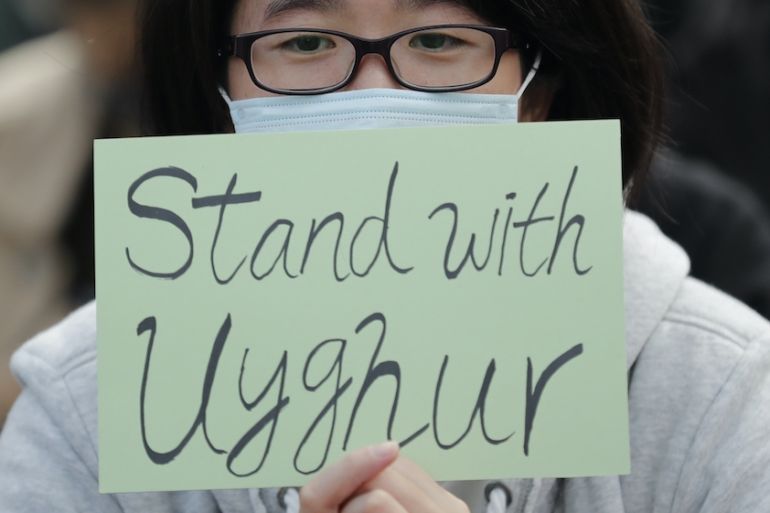US sanctions China’s biotech sector over Uighur rights abuses
The Biden administration hits Chinese companies with export restrictions, citing national security and human rights.

The Biden administration has slapped trade sanctions on several Chinese companies and institutions, citing national security and China’s oppression of its largely Muslim Uighur minority population.
The US Commerce Department said on Thursday that it was blacklisting a number of Chinese technology companies, accusing the government in Beijing of advancing high-tech surveillance on the Uighurs.
Keep reading
list of 4 itemsXinjiang’s ‘architecture of repression’ targets Muslim Uighurs
More countries criticise China at UN for repression of Uighurs
Mass surveillance fuels oppression of Uighurs and Palestinians
The move, which bars the listed companies from trading or exchanging products with the United States, was announced on the same day the US Congress passed legislation targeting exports from China’s western Xinjiang region.
“The scientific pursuit of biotechnology and medical innovation can save lives. Unfortunately, the [People’s Republic of China] is choosing to use these technologies to pursue control over its people and its repression of members of ethnic and religious minority groups,” Secretary of Commerce Gina Raimondo said in a statement.
The Commerce Department also added China’s Academy of Military Medical Sciences and its 11 research institutes to the US list of companies and institutions subject to export controls.
The move follows a US investment ban placed last week on Chinese facial recognition company SenseTime, and could worsen already rocky relations between Beijing and Washington.
The Chinese Embassy in Washington, DC did not respond immediately to a request for comment from the Reuters news agency.
United Nations experts and rights groups estimate more than one million people, mainly Uighurs and members of other Muslim minorities, have been imprisoned in recent years in a vast system of camps in Xinjiang. China denies abuses in Xinjiang.
Human rights groups have recounted unprecedented surveillance of the Uighurs, including tracing with DNA and artificial intelligence operations to recognise and monitor faces.
An independent UK-based tribunal ruled last week the Chinese government had committed genocide, crimes against humanity and torture of Uighurs and other minorities.
The US has described China’s treatment of the Uighurs as “genocide“, citing the situation in Xinjiang in a decision earlier this month to launch a diplomatic boycott of the upcoming Winter Olympics in Beijing.
The Commerce Department added HMN International, formerly Huawei Marine; Jiangsu Hengtong Marine Cable Systems; Jiangsu Hengtong OpticElectric; Shanghai Aoshi Control Technology Co Ltd; and Zhongtian Technology Submarine Cable to its blacklist on Thursday.
The announcement was part of a broader effort by the Biden administration to address China’s use of technology to surveil, repress and control its populations, a senior official told Reuters.
Meanwhile, Congress advanced new legislation aimed at giving the Biden administration more economic tools to punish China for its treatment of the Uighurs.
A bill banning imports from Xinjiang passed in the House of Representatives on December 10 and cleared the Senate in a unanimous voice vote on Thursday.
The bill, which now goes to President Joe Biden for his signature, bans the import of goods from Xinjiang unless suppliers can prove their products were not made with forced labour. Xinjiang is a large exporter of solar panels worldwide.
“It is a horrifying human rights situation, fully sanctioned – as we now know – by the Communist Party of China,” said Senator Marco Rubio, the lead Republican sponsor of the bill. Separately, the Senate action cleared the way for an awaited confirmation vote on Biden nominee Nicholas Burns to be ambassador to China.
Also on Thursday, the US Commerce Department announced trade sanctions on a number of other entities in China, Georgia, Malaysia, and Turkey, accusing them of diverting US items to Iran’s military.
“We cannot allow US commodities, technologies, and software that support medical science and biotechnical innovation to be diverted toward uses contrary to US national security,” Raimondo said.